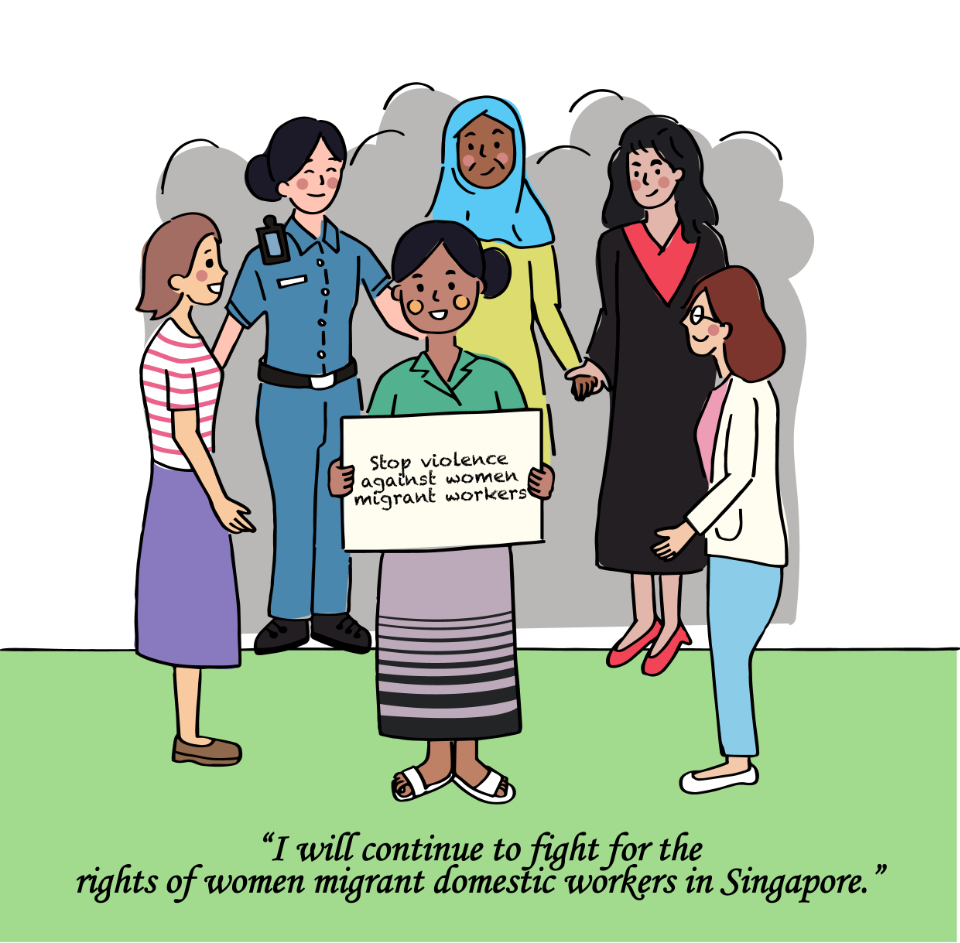“I will continue to fight for the rights of women migrant domestic workers in Singapore.”
Interview with Jaya Anil Kumar, Case Manager, the Humanitarian Organization for Migration Economics (HOME), SingaporeDate:

The Humanitarian Organization for Migrant Economics (HOME) is a Singapore-based civil society organization founded in 2004. HOME is dedicated to empowering and supporting migrant workers, especially those who are subject to violence against women, abuse and exploitation. HOME provides immediate crisis intervention as well as long-term support such as education and training programmes to empower migrant workers. More: https://www.home.org.sg/
Jaya: My name is Jaya, and I work at HOME with migrant domestic workers who are facing well-being issues, including abuse and exploitation in Singapore.
My typical day involves checking in on all the cases that are in our shelter, ensuring that the relevant follow-up actions are done, and conducting intake interviews for new cases. Due to COVID-19, we have encountered an increase in violence against domestic workers, who are predominantly migrant women, seeking assistance. As a result, our working hours have increased.
The year 2020 has been particularly challenging as we have had to change the way our operations are managed. We have shifted our operations from providing face-to-face services to rendering most of our services remotely.
Singapore is a small country with a population of about 5.7 million people. There are currently around 252,600 migrant domestic workers working in the country. They fill crucial care gaps in Singaporean households as live-in domestic workers. Many families rely on them.
Domestic workers are working tirelessly to help Singaporean households during the COVID-19 pandemic. However, many migrant domestic workers in Singapore face challenges in their daily lives especially with regards to violence, abuse and labour rights violations. Some of them face restrictions on their mobile phone usage, which can put them at further risk of violence as they cannot make a phone call to seek help. Many women migrant domestic workers are also affected by travel restrictions under the 2020 Singapore circuit-breaker measures, which mean they are unable to leave the house. Some of them also face wage cuts with no reduction in working hours. Those who are sudden terminated have no place to go because of delayed or cancelled repatriation flights.
With my team at HOME, I provide case management support to the migrant domestic workers who reach out to us. We provide direct assistance and shelter for domestic workers who have experienced violence, mostly from their employers. We refer the cases to specialized service providers, when needed. We also organize sessions on human rights, labour law and life skills to enhance their capacity, including on prevention of violence. The support received from the Safe and Fair Programme was extremely timely, especially the extra beds in the additional space which enabled us to accommodate more women with adequate social distancing.
Despite the increased work hours and number of cases, the strength and tenacity of domestic workers that I witness keeps me going. The support from my colleagues has also been instrumental in coping with the challenges that COVID-19 has brought.
I will continue to fight for the rights of women migrant domestic workers in Singapore.
The ILO-UN Women programme “Safe and Fair: Realizing women migrant workers’ rights and opportunities in the ASEAN region”, under the global EU-UN Spotlight Initiative to eliminate violence against women and girls, supports front-line service providers to ensure essential services are available for women migrant workers who are subject to violence. More: www.spotlightinitiative.org/safe-and-fair
If you or someone you know has experienced violence against women in Singapore, contact HOME for support no matter your migration status.
- Helpline for domestic workers: 1800 797 7977 (Toll-free)
- Messenger for domestic workers: +65 9787 3122 (Whatsapp / Viber / SMS)
- Helpline for migrant workers: +65 6341 5535
More contacts of service providers are available in the Service Directory for Women Migrant Workers in the ASEAN region: https://bit.ly/services4wmw
Interviewed by: Pichit Phromkade
Written by: Pichit Phromkade
Edited by Gihan Hassanein